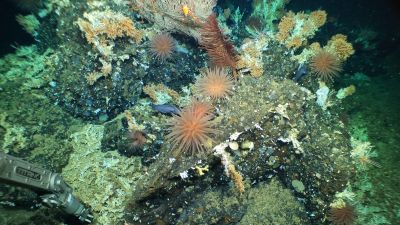'Breathtaking' rare coral reefs discovered deep under sea near Galápagos Islands

Rare coral reefs teeming with life have been discovered by marine biologists deep under the sea near the Galápagos Islands.
The ancient coral reefs lie thousands of feet down and have only been discovered by using a mini submarine which can travel into the depths of the oceans.
Now scientists say the reefs could be a game-changer in the way they monitor the health of coral reefs around the world.
University of Essex said its marine biologists were part of the international team which had found the ancient coral in the Galápagos Marine Reserve off the coast of Ecuador.
They described the find as "exciting" and the first of its kind in the protected underwater reserve since it was set up in 1998.
The first reef was found 400-600m (1,310-1,970 feet) deep on the ridge of a submerged volcano and supports a "breathtaking mix of deep marine life".
Dr Michelle Taylor, from Essex’s School of Life Sciences and Dr Stuart Banks, from the Charles Darwin Foundation, Ecuador, were diving in the deep-sea research submersibleAlvin when they made the discovery.
The sub has new ultra-high definition cameras which were able to record the sights of the reefs in incredible detail.
Dr Taylor, chair of the Deep-Sea Biology Society, said the reefs were notable because in very deep seas coral was often 80-90% dead.
She added: "However, the reefs we’ve found in the last few days have 50-60% live coral in many areas, which is very rare indeed.
“They are pristine and teeming with life – pink octopus, batfish, squat lobsters and an array of deep-sea fish, sharks, and rays. These newly discovered reefs are potentiallyof global significance – a canary in the mine for other reefs globally – sites which we can monitor over time to see how pristine habitats evolve with our current climate crisis.”
Dr Taylor and Dr Banks are part of an international group of scientists onboard the US Navy-owned and WHOI-operated research vessel Atlantis, that is undertaking the Galápagos Deep 2023 expedition.
Scientists said the new discovery suggests that deep-water coral reefs have existed for centuries near the Galápagos Islands.
Dr Stuart Banks, Senior Marine Researcher at the Charles Darwin Foundation, and national observer on this expedition, added: “The captivating thing about these reefs is that they are very old and essentially pristine, unlike those found in many other parts of the world’s oceans."
He said the ancient reefs were of huge importance and it was likely others could be discovered in the area.
The exhibition is led by scientists from Woods Hole Oceanographic Institution, the University of Bristol, Boise State University and the University of Essex, in collaboration with the Galápagos National Park Directorate, Charles Darwin Foundation and Ecuadorian Navy’s Oceanographic and Antarctic Institute.
Want a quick and expert briefing on the biggest news stories? Listen to our latest podcasts to find out What You Need To Know